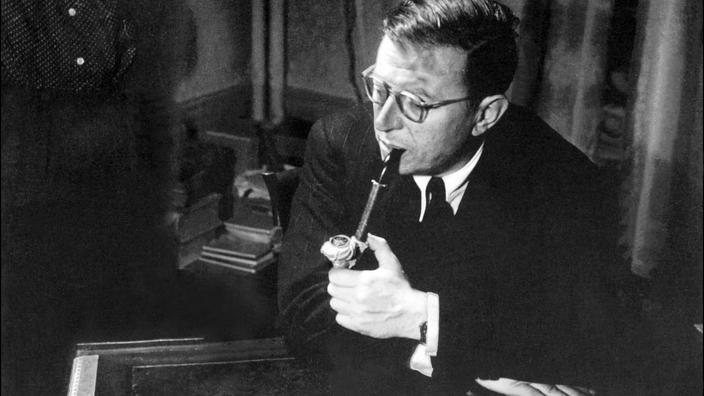Henri de Monvallier is associate and doctor of philosophy. He has been running a popular university in Issy-les-Moulineaux since 2018. He is the author of several books including
Les Imposteurs de la philosophy
(Le Passeur Éditeur, 2019) and publishes
Le Portefeuille des philosophes
(Le Passeur Éditeur
, 2021, 165 p ., € 18).
FIGAROVOX. - You show that the philosophers do not necessarily have a behavior in agreement with their philosophical remarks on the money. What about Plato who passed a very severe judgment on him?
HENRI DE MONVALLIER. -
My first chapter is indeed devoted to Plato because, with his western opposition between the good Socrates and the brutes and the mobsters that are the sophists, he largely contributed to found in the West the idea that the philosopher should despise the money and that philosophy was a pure, free and disinterested exercise which should aim only for the truth and the care of one's soul. If the word "sophist" is charged, even today, with a negative meaning and signifies the absence of thought or the defense of indefensible causes (man is the measure of all things, the boundless outburst of desires, violence against reason, etc.), it is because of the vision that Plato gives.
We tend to take this Manichean vision at face value when there is a thought of the sophists (Jacqueline de Romilly wrote a book on this subject). Concerning the question of money, Plato reproaches the sophists for being paid for their lessons while Socrates gives his generously and free of charge (but what does he live on? He does not specify it).
This is where biography and sociology must come into play.
Plato comes from a large aristocratic family in Athens, his family went back, through his mother, to Solon, the founder of Athenian democracy.
In fact, he never had to work and we can better understand what Pierre Bourdieu calls in
Les Meditations pascaliennes
the “scholastic” relationship to Plato's world, that is to say a purely contemplative, free and liberated relationship. urgently practical.
Plato does not have harsh words for sophist motivated solely by greed.
However, he did not hesitate to ask the tyrant Dionysius the Younger for money while he was in Syracuse in 367 and to advise him on his management ...
Henri de Monvallier
The sophists come from the middle class and need to earn a living: current philosophy teachers are moreover more the heirs of the sophists than of Socrates or Plato in this sense.
But, when we look at Plato's correspondence (we have a few letters left), in particular Letter XIII, we realize, and it's quite funny, that Plato, who does not have words harsh enough for motivated sophists purely by the lure of profit, does not hesitate to ask the tyrant Dionysius the Younger for money while he is in Syracuse in 367 and to advise him on his management ...
In antiquity, people insisted on the idea that a philosopher should lead a life in accordance with his writings.
Henri de Monvallier
And Seneca, criticized for his fortune in contradiction with his writings?
The case of Seneca is emblematic.
On the one hand, he never ceases to openly despise money in his writings, to advocate detachment from him, sobriety and even poverty (he goes so far as to take the minimalism of Diogenes the Cynic as his model).
And on the other hand, he is one of the richest men of his time since he is the fourth fortune in Rome of his time: 300 million sesterces, as Tacitus tells us, or 228 million euros!
Today, it would be in the annual ranking of the great fortunes of Challenges!
Sénèque was a ferocious loan shark who provoked a revolt in 67 in Brittany for a loan at interest that was slow to reimburse him.
Henri de Monvallier
Seneca was also a fierce usurer who provoked a revolt in 67 in Brittany for a loan at interest that was slow to reimburse him.
Dion Cassius tells us in his
Histoire romaine
that the author of
The Tranquility of the Soul
"
had lent the Bretons 40 million sesterces, in the hope of obtaining high interest, then demanded immediate payment by taking measures of violence
”… In Antiquity, people insisted on the idea that a philosopher should lead a life in accordance with his writings.
We see that this is very problematic here.
Concerning Kant, what can we say about the relationship between his philosophical thought and his attitude towards money in his daily life?
In paragraph 85 of his
Anthropologie du point de vue pragmatique
, Kant criticizes avarice and we can say that he himself had a practice related to his theory.
He has always been generous with those around him.
While he is what was called at the time Privatdozent, a university professor paid directly by his students, he allows Wasianski, one of his future secretaries who will also be his executor and who left us his memories on the author of the
Critique of Pure Reason
, to follow his courses for free.
Kant was therefore moral on this ground and at the height of his philosophy: he always considered money as a means and never as an end.
Henri de Monvallier
Kant also paid very well his servant, Martin Lampe, to the point that he was, at the end of his life, more at ease than Kant himself!
Even after dismissing him under stormy conditions, he pays him a life annuity.
Nothing compelled him to.
Likewise, Kant grants a pension to his younger sister who occupies a bed in the hospice and regularly increases the sum he pays her.
He also helps her son who is also in need.
Kant was therefore moral on this ground and at the height of his philosophy: he always considered money as a means and never as an end.
Sartre financed many of his relatives: taxes, medical consultations, rents, etc. Beyond his generosity, was it a way to make others dependent on oneself? How did he view money?
Sartre was extremely generous, almost sickly, I want to say.
He was pulling out his checkbook before we even asked him!
At the end of her life, Simone de Beauvoir tells us in her
Memoirs
that he distributes his money so much to the right and to the left that he does not even have enough to buy a pair of shoes!
I believe that this disproportionate generosity, this contempt for the money displayed (from the moment when he gained a lot of it thanks to the success of the little book
Existentialism is a humanism
) is linked to his visceral hatred of the bourgeois who guided his life.
Sartre advocates an ethics of disproportionate spending against the bourgeois management of "good father" who pays attention to the relationship between income and expenditure.
Is this a way to make others dependent on oneself?
In fact, yes.
But it is also a means of making others more free, of maximizing their possibilities lessened by financial embarrassment: in this sense, Sartrean financial practice, however excessive it may be, is in phase with its absolutist vision (and to my opinion very questionable, but that's another debate) of freedom.
Many philosophers seem to be interested in money when it is lacking. Is our relationship with money conditioned by our financial situation?
Yes, as Pascal Bruckner says in his book
The Wisdom of Money
(2016), talking about money is always a bit about yourself. And besides I give my own salary in the conclusion of the book to situate myself! But we can be interested in money and theorize the relationship that a philosopher can and should have with money without necessarily lacking (see Plato and Seneca, of which we have spoken). One can also, like Hegel who lacked money for a large part of his life, not broach the theme in his published work (apart from a few very general and abstract passages in the
Principles of Philosophy of Law
) and talk about it entirely. time in his private correspondence.
The books that count in philosophy have often sold poorly or little during the lifetime of their author.
Henri de Monvallier
"
First of all, there are two kinds of writers: those who write to say something, and those who write to write
", that is to say to earn money, says Schopenhauer.
Does writing necessarily have to be free from financial constraints to be of value?
Are quality writing and profitability irreconcilable?
It is difficult to generalize on this question. Schopenhauer himself was rentier and he was able to write whatever he wanted without depending on the success of his books (which sold very little during his lifetime). If you want to sell, it is easier to respond to a request and to offer yet another Little Philosophy of Happiness or I do not know what
feel good book
, as they say and as we see blooming every week on the new bookstores table. , than to say that our life has no meaning and that we are doomed to nothingness and death. It is less seller.
In fact, the books that count in philosophy have often sold poorly or little during the lifetime of their author.
It took five years for the 1000 copies of the first edition
of Marx's
Capital
to elapse, while a century later this book was to be at the center of the ideological quarrels of the twentieth century.
In literature, Flaubert and Proust were free from financial constraints and did not wait to receive their royalties to pay their rent.
However, there are exceptions to this trend: Simenon, who entered the Pleiade a few years ago, sold millions of pounds during his lifetime and had become very rich.
He was a popular writer with a literary depth, and also a philosophical one for that matter, I will perhaps speak about it one day in another book.
"
It is undoubtedly in his empty wallet and stomach that we must also look for the roots of his anger in the face of social injustice, exploitation and misery,
" you write about Marx. Do we have thoughts of his material condition?
In the 1850s, while in London, Marx experienced great material and financial difficulties, details of which he recounts in his letters to Engels. He and his family suffer from hunger and disease and one of his children (Edgar) even dies of malnutrition during this period: we are really in
Germinal
! In 1864, his mother finally agreed to give him her share of the inheritance that she had refused him for years, which allowed the financial grip to loosen. It was in fact during this period that he began work on
Le Capital,
whose book I appeared in 1867. J
I allow myself to insist on this point because people often make fun of Marx by saying that he is a bourgeois who has never worked and who has only met the proletarians in libraries.
It's not false.
But all the same, during this period, he experienced very difficult material living conditions which, despite everything, could bring him closer to the suffering of the proletariat of his time and which also orient the thought of money, work and society. exploitation found in Book I of
Capital.
Le Passeur Publisher Henri de Monvallier, The portfolio of philosophers.
Untimely essay, Le Passeur Éditeur, 165 p., In bookstores on September 2, € 18.


/cloudfront-eu-central-1.images.arcpublishing.com/prisa/MF5SGYNANFD3JDOEDWYWMSKS7U.jpg)



/cloudfront-eu-central-1.images.arcpublishing.com/prisa/SELJZCEZBNDZBPMNSIAZKYPXGE.jpg)

